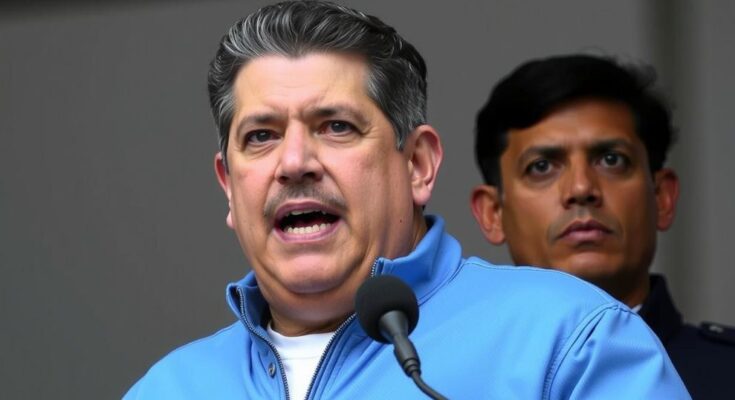Nicolás Maduro has been sworn in for a third presidential term in Venezuela after disputed elections that are widely criticized by the opposition and the international community. Despite declaring his commitment to peace and democracy, allegations of electoral fraud and ongoing governmental repression continue to overshadow his leadership. The recent detention of opposition figures and a United Nations report on intimidation in Venezuela highlight the country’s political turmoil.
Nicolás Maduro has been officially sworn in for a third term as the President of Venezuela, following a contentious electoral process that took place amidst widespread allegations of fraud. This inauguration occurred six months after the July elections, which both the opposition and numerous international observers deemed illegitimate. During the ceremony held in parliament, President Maduro made a commitment to fostering a period of peace and progress throughout his new six-year term.
International reactions to the election have been predominantly negative, with countries such as Brazil and Colombia rejecting the official results that declared Maduro the victor. Despite Maduro’s reaffirmation of his presidential role, optimism regarding his leadership remains low both domestically and internationally. Noteworthy events surrounding the election period include the arrest and subsequent release of opposition leader María Corina Machado, who has been vocal in her dissent towards Maduro’s government.
In his inaugural address, Maduro stated, “I swear that this new presidential term will be one of peace, prosperity, equality and new democracy. I swear it by history, I swear it on my life. I will keep my word.” This proclamation is set against a backdrop of political unrest and accusations of state-sponsored repression aimed at opposition figures, including a recent arrest warrant for Edmundo González, the opposition candidate recognized by the international community as the rightful president-elect.
Compounding these tensions, the United Nations has raised concerns about reports of arbitrary detentions and intimidation tactics employed by the government ahead of recent opposition demonstrations. Notably, the organization voiced alarm regarding the recent kidnapping of Carlos Correa, the leader of a press freedom NGO, emphasizing the precarious state of human rights in Venezuela. Overall, Maduro’s inauguration represents a continuing chapter in Venezuela’s tumultuous political landscape, characterized by severe strife and contentious governance.
Venezuela’s political climate has been contentious for several years, particularly since the death of longtime leader Hugo Chávez. Following his regime, Nicolás Maduro has held power amid multiple crises including hyperinflation, shortages of basic goods, and mass emigration. The legitimacy of Maduro’s government has been historically challenged, especially after controversial elections. The opposition and the international community have consistently cited electoral irregularities, leading to claims that Maduro’s presidency lacks democratic legitimacy. Such dynamics have fostered an environment of political strife in Venezuela, drawing criticism from various global leaders and organizations.
In conclusion, Nicolás Maduro’s inauguration for a third term, amid highly contested elections and allegations of fraud, underscores the ongoing political crisis in Venezuela. The refusal of the international community to recognize his presidency, coupled with increasing repression against opposition figures like María Corina Machado and Edmundo González, illustrates the deep divisions within Venezuelan society. As Maduro pledges a term of “peace and prosperity,” the reality on the ground remains fraught with tension and challenges to human rights.
Original Source: www.bbc.com




